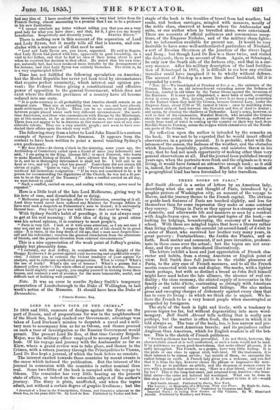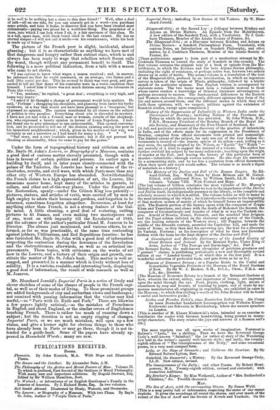THREE BOORS ON PARIS. * Bell Smith Abroad is a series
of letters by an American lady, describing what she saw and thought of Paris, introduced by a graphic picture of Washington city, an account of the voyage to Havre, and the journey thence to the French capital. The obvious or guide-book features of Paris are touched slightly, and less for themselves than for some impression they make or some contrast they convey. Things in Paris as they appear to a stranger seeking a domicile, and afterwards life and manners as seen by a resident with Anglo-Saxon eyes, are the principal topics of the book,—as looking for lodgings, housekeeping, the economy of a boarding- school. With these are mingled topics that have a literary rather than living character,—as the account (at second-hand) of ftvisit to a sister of Marat, who survived her brother very many years, in great poverty ; Fontainebleau ; the Jardin des Plantes, and so forth. Book matter and comment, if not pure invention, predomi- nate in these cases over the actual ; but the topics are not over- done, and they are often introduced illustratively. The letters exhibit a keen and just appreciation of French cha- racter and habits, from a strong American or English point of view. Bell Smith does full justice to the visible pleasures of Paris, to the airy ease of French manners, and to all the French merits connected with taste and display. She marks, with a lighter touch perhaps, but with as distinct a brand as John Bull himself might have used before the late alliance, the absence of real cor- diality ; the close economy, the stinted supply of necessaries in the family or the table d'hôte, contrasting so strongly with American plenty ; and several other national failings. She also makes gross and sweeping charges of dishonesty against every class that has to earn its living : in which we think she is unjust. We be- lieve the French to be a very honest people when uncorrupted or unspoiled by foreigners.
The style of the book is light and lively, with a tendency to pursue topics too far, but without degenerating into mere word.- mongery. Bell Smith Abroad tells nothing that is really new perhaps, but the matter is often fresh, the manner in which it is told always so. The tone of the book, too, is less narrow and pro- vincial than of most American travels; and its prejudices rather Anglican than American, which for English readers is all the bet.- ter. This is the sketch of French politeness.
" French politeness has become proverbial. I do not think, however, the characteristic aimed at is well understood, or such a term would not be Used. If by politeness we mean good-heartedness, that seeks others' pleasure, it is sadly misapplied. The French, as a people, have very little feeling. It is the pride of one class to appear civil, well-bred. Of the tradesmen, it is their interest to be almost servile ; but outside of these, we encounter the rudest beings on earth. A French lady gives you a welcome, and you feel that it is from the lips, however choice the phrase or impressive the man- ner. You go to purchase an article, and the shopman or woman comes to you with a manner that seems to say, 'Here is a dear friend, what can I do for her ? This is the long-lost sister, just returned from America—the beau- tiful sister—the sister not beloved but worshiped. What can be done in this shop for this good relative ? would it be pleasant to take it all—would
• Bell Smith Abroad. Published by Derby, New York.
The Louvre ; or Biography of a Museum. With two Plans. By Bayle St. John, Author of " Purple Tints of Paris." Published by Chapman and Hall. Imperial Paris ; in luding New Scenes of Old Visitors. By W. Blaachard Jerrold. Published by Bradbury and Evans.
it be well to be nothing but a slave to this dear friend ?' Well, after a deal of talk—all on one side, for you can scarcely get in a word—you purchase some article, and take it home, to discover that you have been cheated most xiditmlonsly—paying two prices for a worthless thing. The proprietor of a store, into which I can look when I sit, is a fair specimen of this clam. He is a tall, spare man, with black beard oiled to the last extent. He has an eternal simper—I will not call it smile—on his countenance, while his back is made up of hinges?'
The picture of the French poor is slight, incidental, almost glancing ; but it is as characteristic as anything we have met of that dangerous and hungry rather than outcast class, which is and always has been ready to wage that rebellion which Bacon calls the worst; though without any permanent benefit to itself. The following is a more political indication, from a talk with a mason who came to set stoves.
• "I was curious to know what wages a mason received ; and, in answer, he informed me that he could command, on an average, two francs and a half (fifty cents) per day. This he seemed to think was very good, and pro- ceeded to tell me that many of his comrades were in a worse condition than himself. I asked him if there was not much distress among the labeuren in Paris this winter.
"'Yes, madame,' he replied, a great deal ; everything is very high, and taxes very heavy.' "I asked if he thought a change of government would help matters. He said, 'Perhaps' ; shrugging his shoulders, and glancing from under his bushy eyebroivs, in a way that would not have been pleasant to a bourgeois,' but expressed no opinion. The caution manifested by all classes on the subject of politico is very peculiar. Everything about you is shrouded in mystery. I have not yet met with a French man or woman, outside of the shopkeep- ers, who expressed a hearty opinion in favour of Louis Napoleon. I have opt found one to give utterance to one unfavourable. This opened conversa- tion, and he proceeded to tell me of the distress existing among the poor in his immediate neighbourhood; which, given in his matter-of-fact way, was certainly as sad a narrative as I had heard for many a day. * * * "-Sad story, and a very laudable sentiment; but it did not prevent his cheating us abominably, when we came to pay for the grates."
Under the form of topographical history and criticism on art, Mr. Bayle. St. John's Louvre, or Biography of a Museum, contains a good deal of curious matter cleverly presented, though with a bias in favour of certain politics and persona. In earlier ages a .building by itself, and in later years closely-connected with the palace of the Tuileries, the Louvre has been a witness of the vi- cissitudes, revolts, and civil wars, with which Paris more than any other city of Western Europe has abounded. Notwithstanding the French claims to a high appreciation of art, the Louvre, like museums nearer home, kept many of the articles in garrets, in cellars, and other out-of-the-way places. Under the Empire and the Restoration, openly—under the Citizen King less patently- hictures, statues) and.articles of vertu, were carried off by men in igh employ to adorn their houses and gardens, and forgotten to be returned, sometimes forgotten altogether. Reverence, at least for anything other than French, is not a strong feature of the Gal- lia mind. A little cleaning, a good deal of restoring, cutting pictures to fit frames, and even making two masterpieces out of one, went on with impunity till the Revolution of 1848, and the advance of the author's particular friend, M. Jeanron to be Director. The abuses just mentioned, and various others, he re- formed, as far as was practicable, at the same time contending aaggaeitnst jobbers, Utilitarians, and Red Republican fanatics : he has also furnished Mr. Bayle St. John with a good deal of information respecting the contention during the fierceness of the Revolution and the obstructiveness afterwards, as well as on artistical im- provements. These topics, with criticisms on the works of art now in the Louvre, and a history of their origin and growth, con- stitute the matter of Mr. St. John's book.- This matter is well ar- xanged, andpresented.in a manner which is lively without loss of solidity. It is a various, readable, and interesting book, displaying a good deal of information, the result of wide research as well as M. Jeanron.
Mr. Blanchard Jerrold's Imperial Paris is a series of lively and clever sketches of some of the classes of people in the French capi- tal, as well as of their modes of living. To these prominent groups are added backgrounds of city and aurburban viewaand landscapes ; not unmixed with passing information that the visitor may find useful,—as "Paris with its- Knife and Fork." There are likewise a few papers lightly satirical,—as the mistakes of Frenchmen in English and about England, or the similar errors of Englishmen touching French. There is rather too much of running down a subjeet ; but the iteration is not an empty ringing of changes. Imperial Paris, or we are much mistaken, will open up a few vistas, and give a keener sight for obvious things to those who have already been in Paris or may go there, though it is not in- tended for a guide-book. Some of the papers have already ap- peared in Household Words ; many are new.



























 Previous page
Previous page